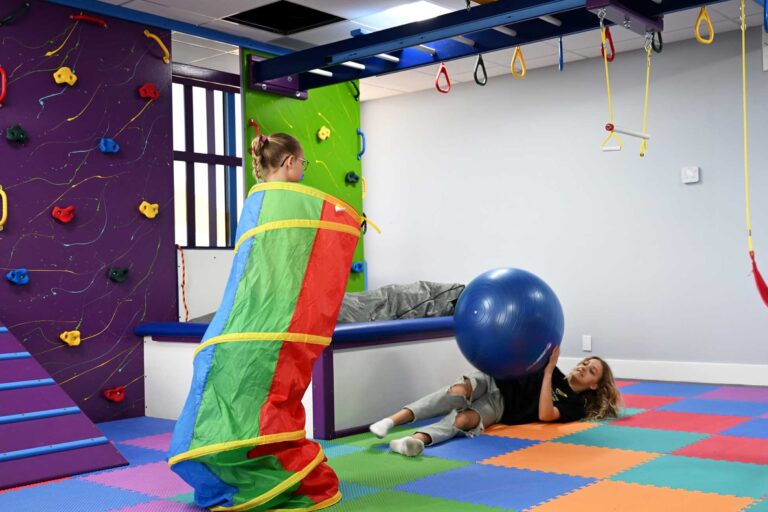As the Winter cold recedes in favor of a pleasant Spring, the playgrounds and streets are abuzz with the sound of children. We celebrate activity in April, with National Playground Safety Week (April 24-27) and Every Kid Healthy Week (April 24-28) running simultaneously. These two national holidays celebrate safe play and physical activity, two cornerstones to happiness and the well-being of children.
At ABA Centers of Florida, we believe that getting out there and stretching one’s legs is important for developing kids with autism spectrum disorder (ASD). In our effort to offer the best Applied Behavior Therapy (ABA), we ensure that kids on the spectrum have many fun activities that keep them active and engaged. Exercise and play are useful therapeutic tools that deserve emphasis, and ABA therapy ensures neurodivergent kids have them as an outlet for expression and socialization.
This article celebrates National Playground Safety Week and Every Kid Healthy Week by covering the importance of exercise for kids, specifically in autism therapy.
1. The Two National Weeks
Kids need a safe space to play. This truism is the idea behind National Playground Safety Week. The event was first established in 1997 by the National Program for Playground Safety (NPPS), a non-profit organization dedicated to improving playground conditions for kids’ well-being. It came about after the NPPS conducted a study that found that over 200,000 children are injured yearly on playgrounds.
The organization wanted to do something to address this issue and launched a national awareness campaign about playground safety. Community organizations conduct playground inspections and safety seminars to ensure the parks our children use to play are welcoming and up to snuff.
The history of Every Kid Healthy Week started in 2002 when Action For Healthy Kids (AFHK) began organizing to improve children’s health through physical exercise and fight rising childhood obesity rates. By 2013, many schools had recognized the importance of this mission and integrated the week into their calendar. The day aims to inform parents about how vital physical exercise is to their children’s health.
Together the two days signify our societal commitment to physical health and safety, giving our kids safe and vibrant spaces to play and strengthen their bodies and minds.
2. Fitness and ABA Therapy
ABA therapy is the gold standard of autism therapy, backed by decades of research showing it to be the most effective way to teach kids on the spectrum enduring skills that will help them personally and professionally. Progress happens with an increase in healthy behaviors through positive reinforcement.
One area that has been gaining more attention in recent years is using exercise as part of ABA therapy. Children on the spectrum struggle to play with others and have lower muscle tone when compared to their neurodivergent counterparts, visible as early as 18 to 24 months into infancy.
This disparity is why ABA centers on naturalistic teaching and play therapy. Learning in one’s natural environment or outside while being rewarded for healthy ways of play is a compassionate, effective way of teaching. Research has shown that regular exercise can improve cognitive function, attention, social behavior, and lower anxiety, all areas targeted through ABA therapy.
We introduce exercise into ABA therapy with physical activities and games designed to increase fitness while promoting social interaction and communication. For example, children with ASD may be encouraged to participate in group games requiring them to work together and communicate.
ABA therapy can also include sensory activities. Many children with ASD have problems regulating their responses to different stimuli. Exercise provides sensory input in a structured and controlled way, which can help to improve sensory processing skills over time.
3. ABA Centers of Florida and Staying Active
When incorporating activity into ABA therapy, we don’t just talk the talk. ABA Centers of Florida clinics include sensory rooms and playgrounds where kids can jump, climb, run, and get comfortable with their bodies. These are state-of-the-art inside playgrounds with ball pits, monkey bars, slides, swings, trampolines, and a rock-climbing wall.
Our sensory rooms offer a safe place to get acquainted with sight, sound, and touch without the burden of harsh triggers or crowds. We integrate these into our therapy whenever necessary, giving kids another fun outlet for expression and learning far more stimulating than sitting at a school desk. But we don’t only offer these amenities.
As members of the autism awareness community, we frequently organize events and outings to get the kids acquainted with the outside world in a sensory-friendly way. We organize trips to zoos, horse riding, rock climbing, and bowling, among other activities that help with socialization, motor coordination, and engagement. Our behavioral experts are extensively trained and ready to craft an individualized plan of therapy that will see your child growing in incredible ways.
If you are interested in joining the fastest-growing autism community in Florida and having the best therapy for your child, reach out for a free consultation. You can call us at (772) 773-1975 or contact us through our website. Happy National Playground Safety Week and Every Kid Healthy Week; get out there and play!








